 430
430  15 mins
15 mins Youth Vs. Apocalypse (YVA) is a diverse group of young climate activists working together to lift the voices of youth, particularly youth of colour and working-class youth. Their collective action aims to fight for a livable climate and an equitable, sustainable, and just world.
YVA started as a group of youth in Oakland, California, supported by adults in their community using direct action and lobbying to fight a proposed coal terminal in their city. Building on that momentum. They expanded their focus to other climate justice issues and carried out many actions around the bay area.
Today, YVA has become a vocal group of young people impacting national climate conversations.
To learn more about the power of the work of Youth Vs. Apocalypse, I spoke to Aniya Butler.
Aniya is a 15-year-old spoken word poet, a Lead Circle member at YVA, the coordinator of the “Hip Hop for Climate Justice” initiative, and the organizational management team member.
To top off this impressive list of credentials this year, she was recently awarded the Environmental Humanities Award of the University of Utah.
I was awed by Aniya’s dedication and passion for justice. She shows us that no voice is ever too small when looking to generate large-scale change.
Here is my conversation with Aniya Butler.
Thank you for taking some time to talk with me today. Researching for our interview, I was struck by the fact that you have been writing poetry since you were eight. What got you into writing poetry?
There isn’t a specific thing that really got me into poetry. I just sort of started to write it. I honestly don’t know how. I remember having a book or journal where I used to write my poems, which was my platform for writing my poetry. But I have kept writing poetry and enjoy it so much because poetry allows me to tell the most authentic truth of myself. I can write about how I feel, my different opinions, my experiences and the way I live in this world. Poetry is another outlet for me to tell and live my truth, which is why I love it so much.
That’s really beautiful. I’ve read some of your work, which I find beautiful and powerful. Would you agree to read something from your work right now?
For sure. I’ll pull up a poem for my phone and try to choose something that’s not too long. The first one on my drive is titled “Wide-eyed, Black girl” let me read that.
Wide-eyed, Black girl
Looking at the colonizer’s knee
On her dad’s neck
I can see the terror in her eyes
I see orange skies
And could taste the pollution in the air
The pollution shoved down
Black and Brown people’s throats
I could hear the slave catcher
I mean, police officer
Gloat
About the process
Of taking that Black man’s life
Depriving him of his breath
Laughing about having his knee
On that Black father’s neck
Leading to death
I mean murder
Now there are folks out in the streets
Fists in the air
Voices loud
But somehow
We are still not heard
We are only heard
When things catch on fire
I am tired
I’m responsible
For a mess I didn’t create
I’m hated for the colour of our skin
I get laughed at for standing up to a cause that is too white
But affects too many Black communities
I’m curious.
A 150% increase in attacks against Asian-Americans
It is not a coincidence
Not after a former president pinpointed a whole pandemic on one group of people
Instead of holding himself accountable
He is the one who is responsible
I can only imagine
The pain that Delaina Yaun’s family is feeling
The pain that Adam Toledo’s family is feeling
The pain that Dante Wright’s family is feeling
The pain that Ma’Khia Bryant’s family is feeling
The pain of the families of innocent people
Murdered by the police and white supremacists
Two groups that overlap heavily
Or feeling COVID 19
Is not the only thing disproportionately killing Black and Brown communities
Racism is not only a belief
It is a fatal disease
Racism is the foundation of this country
Along with colonialism
Capitalism
Patriarchy
And white supremacy
I am angry
That we are too busy fighting each other to recognize that
We are not the ones who cause these crises
We are not the ones investing in institutions of destruction
We are following the systems that put us here
The same ones that are corrupt
It’s time
For them to listen to our instructions
Wide-eyed Black girl
Witnessing Brown and Black people
At borders
Separated from their families
Put in cages
Like nothing should be
For seeking asylum from a country who is one of the main reasons for this global catastrophe
How can we justify a country founded
On the kidnapping and enslavement of my ancestors
The genocide of indigenous people
And theft of native land
How can we justify a system
That doesn’t allow every human being
Every living thing
To thrive
To live
To breathe
I will breathe
We need to build a world
With foundations of equity
Sustainability
Honesty
We are not asking for your sympathy
We are not asking for anything
We are demanding
We are demanding
Action against the climate crisis
Action against brutal border control
Action against police brutality
Action against all oppressive systems
And activities that are killing marginalized communities
Wide-eyed, Black girl once saw a police officer
Take her father’s life
His breath
Wide-eyed, Black girl is now the one getting her life, her breath
Taken away
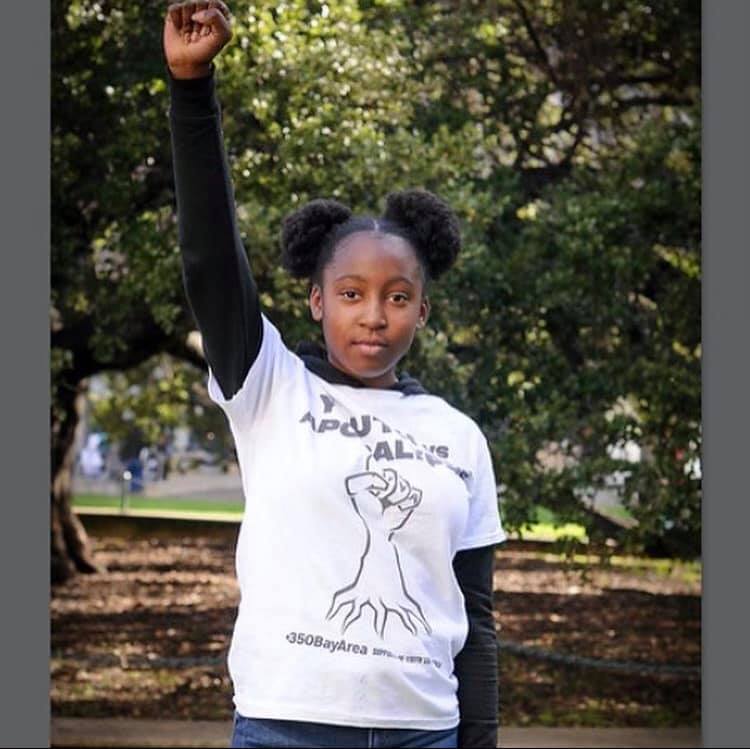
Credit: Youth Vs. Apocalypse Facebook
Thank you so much, Aniya. Your reading of that poem gave me chills. Just listening to your voice, it’s so powerful. There’s so much that you are saying in your work. Can you talk to me about the activism that flows in your poetry and what you’re doin at YVA?
First of all, I’m with Youth Vs. Apocalypse.
My title there and what I do, have changed and grown very much over the past three years. Today I’m doing a lot in terms of different types of organizing. For example, I help a lot with action planning. Recently, I’ve been trying to step back and not be the main leader, supporting other leaders so they can step up into leadership roles. Sometimes what I do looks like facilitating, planning meetings, leading a strike or ensuring that the media is talking to the right youth and the people who have helped organize the action. I also emcee at our rallies and introduce speakers and make sure that just everyone at the action is comfortable and feels safe.
YVA allows me to work on many different issues because climate change is an intersectional crisis. So, many different forms of activism flow through my poetry because of YVA, so it’s hard to touch on a specific one.
The central role of intersectionality in climate justice and the climate justice movement is very important. Could you talk about how you see this and what it means for you and Youth Vs. Apocalypse?
Sure. That’s why I joined YVA. We all know climate change is a scientific issue. There’s no denying it. There’s science to back it up and prove that it’s real. At the same time, climate change is an injustice that intersects with systems that create and maintain other injustices, like social injustice.
For example, the system that funds the police who are killing Black and Brown people also funds the fossil fuel industry, which is also killing Black and Brown people. Looking at it as a system, you can see that this is also the same system that allows brutal practices at ICE (U.S. Immigration and Customs Enforcement) and building coal turbos in frontline communities. When we look at crises like fossil fuels, border control or police brutality, what we see is vulnerable people being hurt by systems they should be able to trust. We see people not having enough jobs, living homeless, living outside, constantly vulnerable and being exposed to pollutants and toxins in the air caused by climate change. We see very high rates of respiratory diseases among Black and Brown people. We see a system that allows the fossil fuel industry to keep a grip over our world instead of forcing it to transition into clean energy. What we see is environmental racism.
Environmental racism is a foundational understanding of intersectionality. Intersectionality has to do with how climate change interacts with all these other issues we face. White supremacy, colonialism, patriarchy, and capitalism all fuel the climate crisis and exacerbate these other social issues. That’s how I see intersectionality and what I talk about in the poem “Wide-eyed Black girl.”
Intersectionality is very complex, but it’s also very simple once you look at things from the root and see how all these different things interact. At YVA, we say it’s just a question of looking at problems from the root.
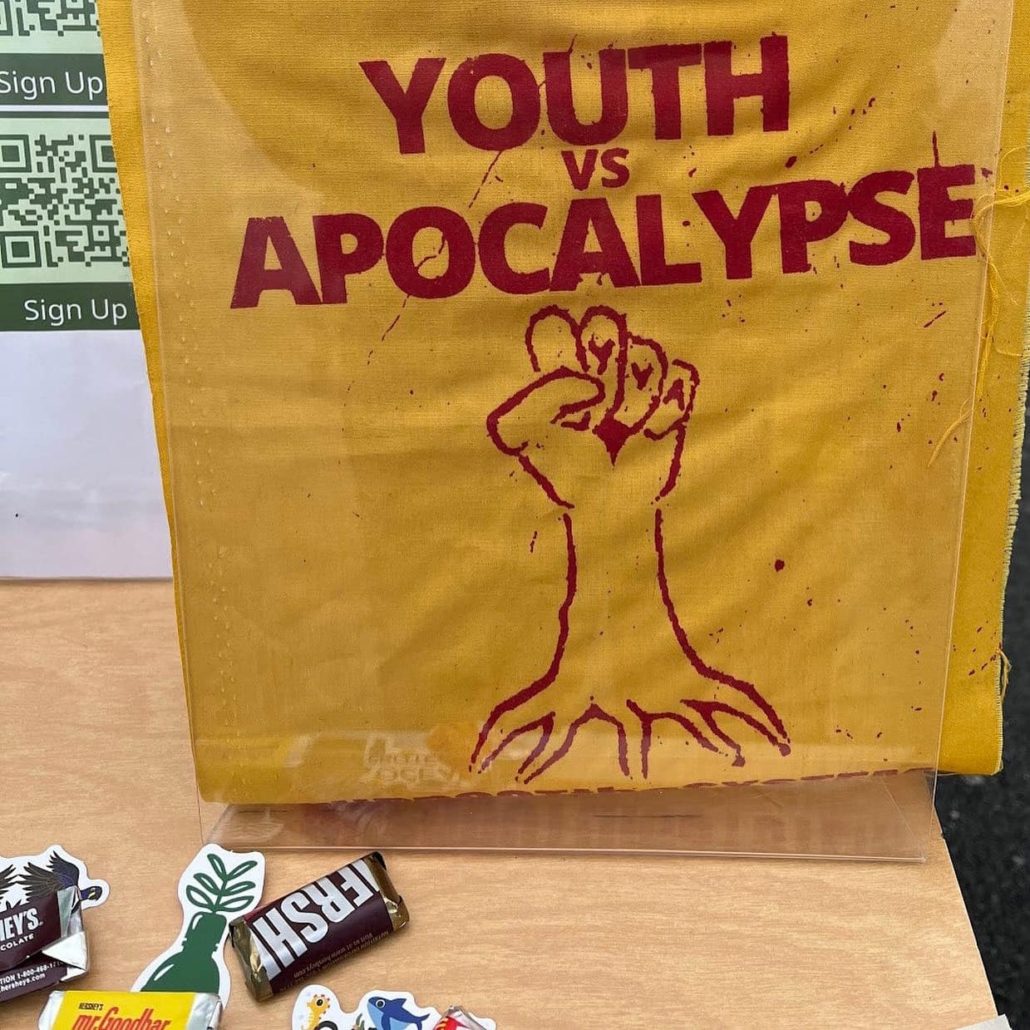
Credit: Youth Vs. Apocalypse Facebook
Aniya, I see that you’ve recently received an impressive recognition, the 2022 Environmental Humanities Award from the University of Utah. It seems incredible that you’re still in high school, and you’ve received the University’s award for your work at Youth Vs. Apocalypse, your climate strike activism and your focus on broadcasting the previously silenced voices of people of colour and of youth. Can you tell me a little more about that award, how you heard about it and what it means?
I was actually at a school dance I had organized when I got the news. I was helping, picking things up and doing some last decorations. Our adult support and program director, Carolyn, came over to me and said, “I sent you an email. You won an award.” I thought, “Okay. Great. Thanks for letting me know.” I was rushed because of the dance, so I didn’t stop and ask questions about the award. Carolyn insisted, telling me, “Aniya, it’s a very big thing. You should check your email. Someone will need to fly with you.” I thought, “Someone will need to fly with me? Where am I going?” I still didn’t realize and thought, ‘Okay, I’ll need to check this out later”.
Later, I ended up reading the email with my mom. Then we called the rest of my family and read it all over again. It felt like a very unreal experience at first. I emailed the University back and expressed my gratitude for the award. I started researching the award, its past winners, and the Environmental Humanities department at the University. I talked to the professor, Jeff McCarthy, who was very welcoming and open. It was all just a very cool experience. I knew there were organizers’ awards, but I never considered myself in that category. So I was just very surprised that I was chosen for this award, out of all the other organizers out there. I’m very grateful, but at the same time, it still feels like a “not real” type of moment.
Afterwards, I went to the University of Utah with my mom and my brother. I accepted the award and talked to many of the students there. I also got the chance to look around the campus. Winning this award was just a very cool experience.
Tell me how Youth Vs. Apocalypse began.
I was not here when YVA first started. But I am very familiar with the story. A group of youth was fighting against a coal terminal being built in the community of West Oakland. It’s a community that historically has already faced so many different types of oppression. For example, due to pollution, West Oakland’s community has asthma rates twice as high as the county’s average.
Putting a coal terminal in that community would have a detrimental impact. There’s no question about that. And, of course, the people building the terminal didn’t care about that – they cared about their money. So a group of youth came together to fight against that coal terminal project along with our co-founder Carolyn.
Carolyn and that group of youth began to go to meetings to pressure Phil Tagami, a prominent developer involved in trying to build the terminal. They asked, “Why are you building this? Don’t you know, this is not good for the community? Do you care about the community?”
And as most adults in power respond, the people in power answered with arguments that expressed dominance over youth and youth leadership by saying, “Listen. We’ve been doing this for a long time. You can’t understand. You’re a child, I’m an adult… blah, blah, blah.”
Luckily, our group of youth is very strong and did not let this discourage them. They continued to fight against the coal terminal. Eventually, their efforts led to a “Youth Vs. Coal campaign.”
Then, a very big incident occurred when a group of youth confronted U.S. Senator Diane Feinstein about the Green New Deal. The incident was recorded and posted online. It went viral, with millions of views. The youth used the momentum this video built to keep that energy going. They organized a strike on March 15th, 2019, followed by another on September 19th, 2019. I was actually part of the second strike.
The participation in the September strike is estimated at 20,000 to 40,000 people. That was a huge moment because we all thought, “We’re in this! We’re actually leading the movement.” And since then, we’ve just wanted to keep that momentum going.
So we went from being a group of youth mobilized against a coal terminal project in West Oakland and expanded out from there. In some ways, we are still a small group. Still, at the same time, we’re a big group in terms of the number of youth we’re engaging with, and now we have three campaigns and different types of programs and staff.
Youth Vs. Apocalypse’s evolution has been great to be a part of.
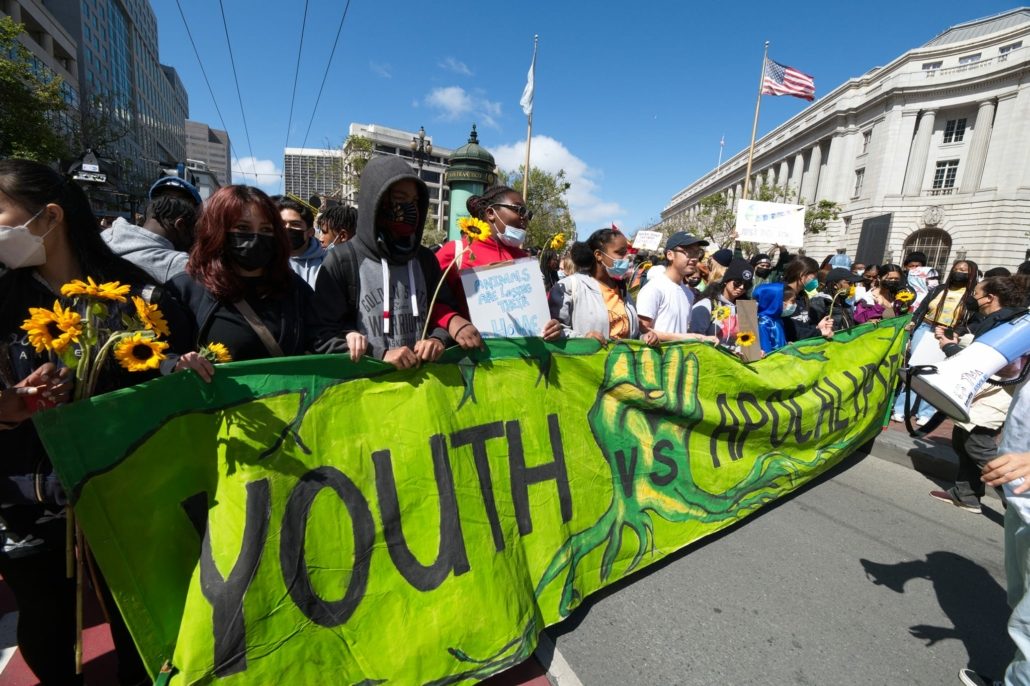
Credit: Youth Vs. Apocalypse Facebook
I find it so fascinating to see how an initiative that starts in a local area has the potential to grow into a global movement. Something about the movement – the people, the passion, the message or the cause – resonates with other communities who pick up, adopt or adapt the original movement’s techniques or strategies. In some ways, it reminds me of Fridays for the Future.
I’d love it if you could share how you organize your work. What are you doing to implement the different actions that you take? How does this all work?
Well, one special thing about YVA is that we really are youth-led.
Other groups use the term “youth”, but some of these are not actually youth-led. Being youth-led is very important. With YVA, youth decide, organize the actions, and lead the campaigns. Of course, I don’t want to ignore the work of the amazing adults who give us a lot of support, but in terms of leadership, youth lead YVA.
I think it’s one of the reasons why we’re so effective. We have a different type of connection and sense of urgency on these issues. We all are eager to get out there and fight against these problems.
Another important thing is how we are connected as youth around what we are doing. We have a few groups doing different things with different campaigns within YVA. We have the “No Coal in Oakland” campaign, the original “Youth Vs. Coal.” This campaign has been very successful because we’ve just recently won the campaign, and there will be no coal in Oakland.
We also have the “California Youth Vs. Big Oil” campaign. This campaign fights against backing Big Oil or granting oil permits in California. We want to stop fossil fuels from continuing to exist in California.
And lastly, we have CALSTRS, which is a divestment campaign. CALSTRS (Editors’ Note: the California State Teachers Retirement System – the largest teachers’ retirement fund in the United States) currently invests $6 billion of its pension funds into the fossil fuel industry. We’re demanding that CALSTRS divest that.
Another project we have is called the Sunflower Project. It’s a campaign for the communities of Bayview Hunters Point and Treasure Island in San Francisco. The Sunflower Projects is fighting to clean up toxic radiation in the community and, in doing so, recognize the intersection with climate change.
What’s important to understand is the enormous amount of work it takes to organize our campaigns and actions. Since August last year, we’ve been doing consistent monthly actions that need to be led and coordinated. We’ve organized several actions around CALSTRS. But there have also been actions in response to national calls to action to stop Line 3 (Editor’s Note: the oil pipeline connecting tar sands in Canada to Wisconsin). Organizing these actions requires lots of different subgroups. People need to lead the action physically, know the route for the marches, do the chants, make sure that youth are holding signs, and talk with the media. There is a lot to do and so many people involved.
An example of this is the “die-in” we organized in front of the offices of BlackRock. We had hundreds of bodies lying in the street, stopping all the traffic in front of their offices. It was very powerful. Organizing an action like this requires strategic thinking. We chose speakers who usually are silenced and made sure that those speakers had a platform to speak about what they’re passionate about and why we were there in the street.
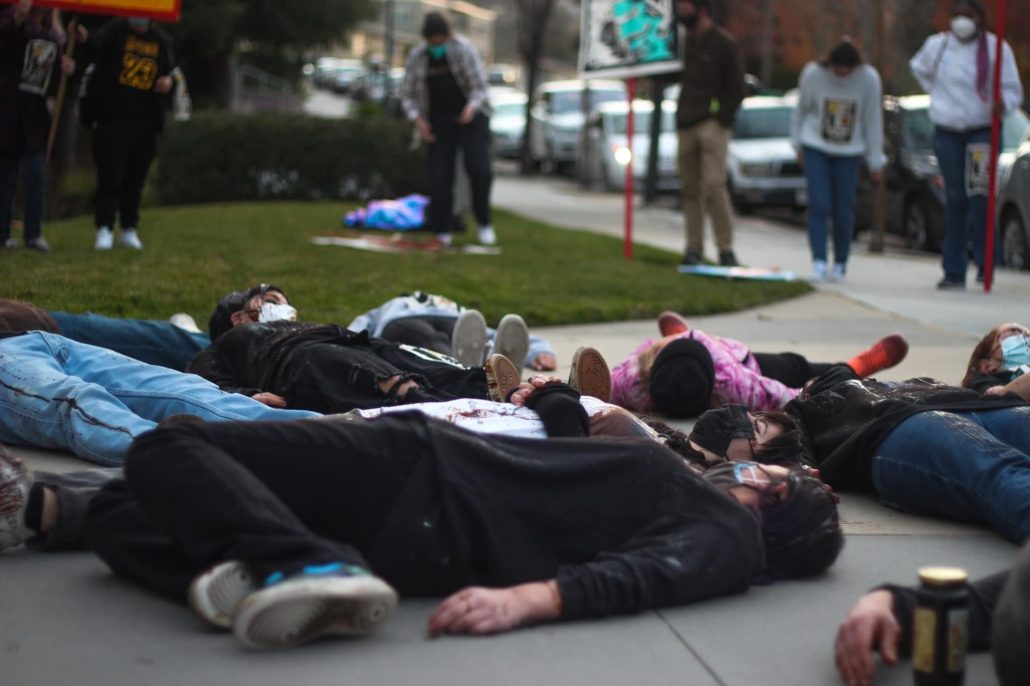
Credit: Youth Vs. Apocalypse Facebook
Ideologically, what’s one of the most essential things to know about Youth Vs. Apocalypse?
There’s no single “correct way” to be an activist or to get involved. You just need to get involved!
Something special about YVA is that we don’t try to enforce skills. Of course, we try to teach certain skills because we need to be able to access them, but we would never deny you because you don’t have a skill. That’s not something we do. It’s not like there’s a written list of what you need to do to fight for climate justice. Or any other justice you’re interested in, for that matter. Because, beyond fighting for justice, this is really a fight for survival. It doesn’t matter what skills you don’t have. What matters is what you do and how you use those skills you do have.
That’s how I got started in this. Three years ago, I didn’t have half the skills I have today. I wasn’t always an organizer. But I did have my poetry. Poetry was the way that I advocated for myself and advocated for my sense of urgency for justice. Whatever skill you have, use it as your medium and your voice. Recognize it, and know that it’s useful. And know that you are heard and that we need whatever you have to offer.
That’s very encouraging for anyone who wants to join. I think it’s important for people to know that something like what you are doing is accessible and that whatever we do has a ripple effect. You’ve talked about the impact of your campaigns and a bit about your poetry. Was there any particular campaign that you really felt was really successful?
Probably “No Coal in Oakland.” It was the campaign that started YVA. I worked on that campaign a little, but I also supported a lot of the youth who worked really hard on that campaign. Our win was a huge moment because it’s something that we had worked on for a long time. And to be honest, sometimes, as a youth, it can get discouraging to constantly work on something without seeing anything change. So to get a win on the very campaign that developed our understanding of climate justice was very relieving.
To be honest, I’m not always a hopeful person. I need to see actual, tangible change happen to believe. So, to see this win made me think, “You know, we actually can win. We are winning. We can do this. We can win the climate justice movement.”
It was a huge thing for YVA too.
From the beginning, this whole thing was youth-led. We had many adults supporting us, and as the campaign advanced, more folks wanted to join and get involved. It was so cool to be able to win our first campaign. And we learned a lot. We learned that different types of pressure – videos, in-person actions, direct actions, talking to the city council directly, and talking to the developer directly – are useful and needed.
Another thing we learned is that different types of organizations, and different kinds of organizing can result in positive and tangible change. That was very cool to see.
What are some of the big challenges YVA has faced in campaigning? There must be some very particular challenges involved with leading such an active peer-to-peer organization. How have you dealt with those challenges?
The biggest challenge is probably youth feeling drained and tired and wanting to take a break from all this.
At YVA, we focus on consistency, frequency, and keeping the energy going. Of course, we take breaks. And we really try to encourage people to take breaks, and as a leader, I want people to prioritize their health. But sometimes, working on a campaign can make you feel drained because we all have so much passion and so much we want for this work. And remember, we still are youth. We want to do teenage things instead of giving up our time to do this. It’s a real challenge – feeling drained, finding a balance, taking care of ourselves, and doing this work.
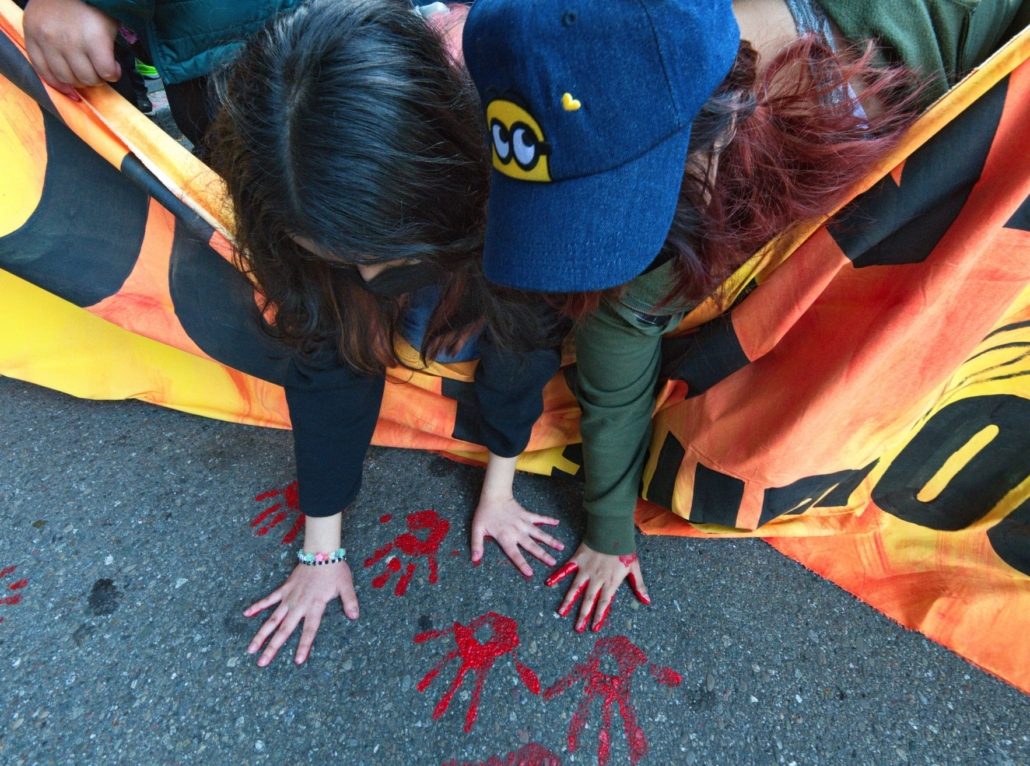
Credit: Youth Vs. Apocalypse Facebook
Could you tell me how you see the future of Youth Vs. Apocalypse from where you’re standing now? Are there any future plans or campaigns you want to work on or push further?
Well, I work on something that isn’t an actual campaign in YVA. I coordinate the “hip hop and the climate justice initiative”. It’s an initiative that’s like a full-circle role for me. I get to help other youth to understand that their advocacy plank can be art, music, hip hop or whatever. They don’t have to do typical “activism organizing” to get involved. We’ve released three music videos, four songs, and an EP with three spoken word pieces in the past couple of years.
So far, this initiative has been very focused on the production side of creating music. In the future, while we will still be doing that, we will also start focusing on creating a curriculum. Along with another team of youth, I facilitate creative writing workshops. Our idea is to create a curriculum we can give to teachers in schools or programs so that they can teach this to their youth. In doing this, we want to focus on healing – using writing and art as a form of healing. YVA offers many opportunities to get involved, and I think it’s important for us to do something that also enables people to heal from all the stress this activism brings. I’m very excited that I will be working on this as the program director.
Where can we find your music and videos and more info about YVA?
Our music is available on the main streaming platforms – Spotify, iTunes, and Sound Cloud. And you can find our three music videos on the Youth Vs. Apocalypse YouTube channel. I hope people will go watch them; we think they’re cool.
Our motto at The inspirer is, “Inspiring People, inspiring people.” I have to admit, I find you to be a very inspiring person. I would really love to know who inspires you?
The people who inspire me are the youth I work with every day.
Working with youth and seeing that I’m not all alone in this movement is something that keeps me going. To be honest, working with youth inspires me to not give up and to remain in the position I am in today and grow in that position.
I think that this movement gives us a chance. I’m working with youth who put what we are doing before themselves. And yes, I understand that, depending on the situation, sometimes this might not always be the best. But to feel that urgency and to see that passion is very inspiring for me. It really keeps me going.
It seems very important to me that people be able to find you, follow you and also support the work that you do. Tell us where we can find out more about what you’re doing on the internet and your socials.
It’s easy to find us on social media. We are Youth Vs. Apocalypse on Instagram, YouTube and Facebook, and our Twitter is Y_Vs_A.
Our website is youthvsapocalypse.org. I think the website is amazing. There’s a lot on it – how we started, the different ways to get involved, ways to support what we are doing.
If you’re in the Bay Area, there are many ways to get involved, whether you’re a youth or an adult. If you’re a youth, you can join a campaign or a team like the “hip hop for climate justice team” or the “social media team.”
You’ll find everything on our website. And if you’re an adult, it’s important to know that we’re always looking for adult support.
But people don’t necessarily have to get involved with us. I would recommend that people just get involved in any way possible. Find a local group that shares your views, that’s going in the same direction as you or is fighting for issues that interest you. And just join in. It’s also important to educate yourself. I feel more comfortable fighting for issues that I understand, so educating yourself is important.
So that’s pretty much it, educate yourself, find something local, get involved, use whatever skills you have to advocate for yourself and go from there.
Please, just get involved.
Feature photo credit: Brooke Anderson



